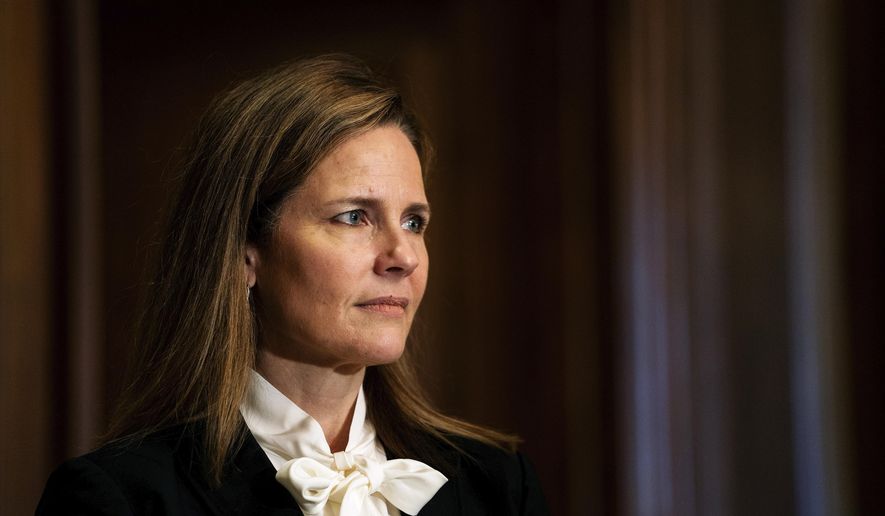Judge Amy Coney Barrett’s speeches to a little-known legal fellowship program run by a Christian nonprofit law firm are expected to provide fodder for Democrats opposing her Supreme Court nomination at next week’s Senate Judiciary Committee hearings, The Washington Times has learned.
Liberals who want to question the effect of Judge Barrett’s faith on her actions without being accused of religious bigotry by conservatives are likely to zero in on her connection to the Alliance Defending Freedom’s Blackstone Legal Fellowship, according to sources with knowledge of the judicial confirmation process.
Senate Democrats are fearful that a 6-3 majority of Republican-appointed justices on the Supreme Court could undermine their liberal policy agenda for a generation. To scuttle Judge Barrett’s elevation to the high court, liberals are expected to portray her as outside the mainstream and point to the Blackstone program as evidence that she is a conservative extremist.
The fellowship is named for Sir William Blackstone, an English judge in the 18th century, and ADF’s program began in 2000. The Christian law firm’s program now involves a three-week training session in the summer featuring seminars on legal philosophy, constitutional law, history, and cultural issues, alongside a summer legal internship, according to its website.
As a law professor at Notre Dame, a Catholic institution, Judge Barrett addressed Blackstone fellows five times on “Construction and/or Interpretation” prior to becoming a federal judge, according to a Senate Judiciary Committee questionnaire that the judge submitted last month.
Judge Barrett’s speeches to the group were previously used as a cudgel at Senate hearings on her nomination to the 7th U.S. Circuit Court of Appeals by former Sen. Al Franken, Minnesota Democrat, before he resigned amid mounting sexual misconduct allegations.
While Sen. Dianne Feinstein’s admonition that the “dogma lives loudly within you” made headlines at the 2017 hearing, Mr. Franken outlined a potent line of attack against Judge Barrett for Senate Democrats in 2020. Mr. Franken called ADF a hate group, citing a label applied by ADF’s political opponents at the Southern Poverty Law Center, and compared Judge Barrett’s decision to speak to the group as akin to speaking at an event hosted by the late Cambodian dictator Pol Pot.
“It sounds like ADF is something of a hate group,” Mr. Franken told Judge Barrett at the hearing in 2017.
“Senator that was not what my interactions with Blackstone were like,” Judge Barrett answered. “The people who I interacted with, we had a wonderful group of students from Notre Dame go. I never witnessed any discriminatory conduct in any way.”
In recent weeks, the Blackstone fellowship has received renewed attention as part of a “fringe” legal movement from the Christian Science Monitor, and the Washington Post pointed to the fellowship as casting doubt on Judge Barrett’s ability to never “bend the law to meet her Catholic faith.”
Rick Garnett, Notre Dame professor and longtime friend of Judge Barrett, has regularly taught at the Blackstone program and thinks attacking it and ADF as a way to tarnish Judge Barrett will backfire.
“ADF is a well-known public interest law firm that’s been extremely successful in the Supreme Court and yeah not everybody agrees with all of their litigation positions, but I suspect that it’s not really a political winner to try to taint somebody for being affiliated with a group that’s won as much in the Supreme Court as they have,” Mr. Garnett said.
ADF touts having won 11 cases at the Supreme Court since 2011. After Judge Barrett’s nomination, ADF petitioned the high court on a case involving a student at Georgia Gwinnett College and received briefs of support from left-leaning advocacy groups such as the American Civil Liberties Union, the Council on American-Islamic Relations, and the American Humanist Association, which advocates for atheists and secularists.
Faculty for the Blackstone Legal Fellowship come from a wide variety of backgrounds as well. More than 70 faculty members typically address the Blackstone fellows each summer, according to ADF, including such prominent speakers as NBC News contributor Hugh Hewitt, a syndicated radio host with 300 affiliates; and Judge Kyle Duncan, when he was general counsel at The Becket Fund for Religious Liberty.
ADF senior vice president Tim Chandler, who oversees the Blackstone program, said it is designed to give law students the framework to treat everyone with dignity and respect for the betterment of society and to do so with excellence and integrity.
ADF thinks any attempt to besmirch Judge Barrett’s reputation by weaponizing her previous connection to the internship program is misguided.
“It is reprehensible for partisan officials, activists, and journalists to weaponize a judge’s faith in an effort to smear her character. This is religious bigotry and prejudice,” said Jeremy Tedesco, ADF senior vice president of communications. “A de facto religious test for public office is offensive to millions of Americans and directly violates the Constitution. Judge Barrett deserves a fair and respectful confirmation process in the Senate.”
Sources with knowledge of the judicial confirmation process do not expect Judge Barrett to distance herself from ADF, should Democrats hone in on Judge Barett’s ties to the Christian firm to raise questions about her judicial independence.
Mike Davis, president of the Article III Project that supports Mr. Trump’s judicial picks, said he thinks Senate Democrats are going to do the bidding of abortion providers like Planned Parenthood and attack Judge Barrett mercilessly during the hearing.
“The Federalist Society of the left is Planned Parenthood and they’re going to force Democrats to bloody up Amy Coney Barrett and this process to protect the abortion industry,” Mr. Davis said. “Judge Amy Coney Barrett is an unapologetic and strong believer and Senate Democrats must end their pattern and practice of attacking her because of her faith.”
• Ryan Lovelace can be reached at rlovelace@washingtontimes.com.




Please read our comment policy before commenting.